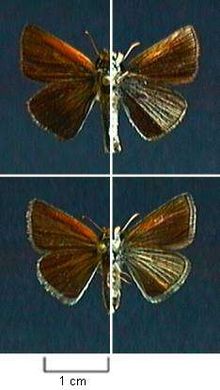Oarisma poweshiek
| Oarisma poweshiek | |
|---|---|

| |
| Scientific classification | |
| Domain: | Eukaryota |
| Kingdom: | Animalia |
| Phylum: | Arthropoda |
| Class: | Insecta |
| Order: | Lepidoptera |
| Family: | Hesperiidae |
| Genus: | Oarisma |
| Species: | O. poweshiek |
| Binomial name | |
| Oarisma poweshiek (Parker, 1870)[1] | |
| Synonyms[2] | |
| |
Oarisma poweshiek, the Poweshiek skipperling,[3] is a North American butterfly in the family Hesperiidae (skippers), subfamily Hesperiinae (grass skippers). The range of this species in Canada is restricted to southeastern Manitoba, and in the United States it historically ranged from the Dakotas to the southern Lower Peninsula of Michigan.[4]
Description
Coloured dark brown on the upperside with an orange along the costa. The underside of the hindwings are dark grey with white veins.[4]
Wingspan is from 24 to 30 mm.[4]
Behaviour
The Poweshiek skipperling emerges in late June or early July and exists in the adult form for approximately a two-week period. During this time the skipperling nectars on a suite of flowers, mates and lays eggs. The larvae feed on graminoid plant species that possibly vary throughout the distribution of this species.[4]
Conservation status
The Poweshiek skipperling was a common prairie butterfly prior to 2005, but suffered a population crash between 2005 and 2015. The Poweshiek skipperling has a NatureServe ranking of G1 or critically imperiled.[5] It is threatened by degradation and modification of its native prairie habitat by overgrazing, invasive species, and conversion to cropland.[6] This species was awarded endangered status under the United States Endangered Species Act in 2014[6] after gaining candidate status in 2011.[7] The Poweshiek skipperling was assessed as threatened by Committee on the Status of Endangered Wildlife in Canada (COSEWIC) in 2003, then, in 2005, the species was added to Schedule 1 with the status threatened under the Species at Risk Act (SARA), in Canada. In 2014, the species was reassessed as endangered by COSEWIC.[8] In February 2019, the SARA status was changed to endangered.[9]
In 2018, the Minnesota Zoo began efforts to rear them in captivity, for release in the wild.[10][11] In 2022, the Minnesota Zoo released over 100 individuals in to the wild.[12]
References
- ^ Parker, H. W. 1870. A new Hesperian. The American Entomologist and Botanist 2:271-272.
- ^ Oarisma, funet.fi
- ^ Koerth, Maggie (December 15, 2022). "The Butterfly Effect". FiveThirtyEight. Retrieved December 16, 2022.
- ^ a b c d Poweshiek Skipperling, Butterflies of Canada
- ^ Comprehensive Report Species - Oarisma poweshiek. (n.d.) NatureServe http://www.natureserve.org.
- ^ a b U.S. Fish and Wildlife Service. 2014, October 24. Endangered and Threatened Wildlife and Plants; Threatened Species Status for Dakota Skipper and Endangered Species Status for Poweshiek Skipperling. Federal Register.
- ^ U.S. Fish and Wildlife Service. 2011, October 26. Endangered and Threatened Wildlife and Plants; Review of Native Species That Are Candidates for Listing as Endangered or Threatened; Annual Notice of Findings on Resubmitted Petitions; Annual Description of Progress on Listing Actions. Federal Register.
- ^ COSEWIC. 2014. COSEWIC assessment and status report on the Poweshiek SkipperlingOarisma poweshiekin Canada. Committee on the Status of Endangered Wildlife in Canada. Ottawa. xi + 43 pp.(www.registrelep-sararegistry.gc.ca/default_e.cfm).
- ^ Department of Environment and Natural Resources of Canada. (n.d.). Poweshiek Skipperling (Oarisma poweshiek) - Species search - Species at risk registry. https://species-registry.canada.ca/index-en.html#/species/796-333.
- ^ "Saving Prairie Butterflies".
- ^ "FLITTING AWAY", Kieth Methney, The Detroit Free Press, July 13, 2018, page A1
- ^ "Minnesota Zoo on Instagram: "This little one is a Poweshiek skipperling- one of the most endangered animals on the planet. This summer, #MNZoo researchers released over 100 individuals to help save this species from extinction. There are likely fewer than 500 individuals left in the wild. 🦋💚"". Instagram. Retrieved August 21, 2022.
External links
- Abdel-Razzaq, L. (November 17, 2013). "Michigan could be last hope for rare butterfly, feds say". The Detroit News. Archived from the original on November 19, 2013.
- NatureServe. 2014. Oarisma poweshiek. NatureServe Explorer.
Further reading
- Swengel, A. B. and S. R. Swengel. (2014). Paradoxes of Poweshiek Skipperling (Oarisma poweshiek) (Lepidoptera: Hesperiidae): Abundance patterns and management of a highly imperiled prairie species. ISRN Entomology 2014 216427.

